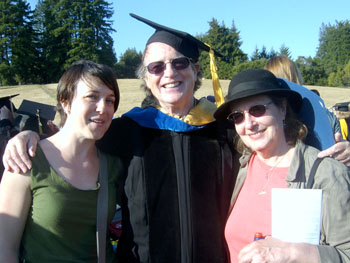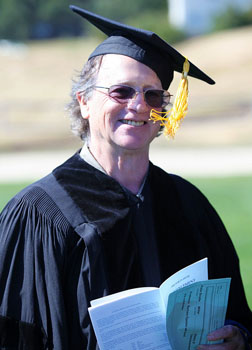Campus News
The long and winding road to graduation: Histcon grad takes 40 years to earn Ph.D.
History of Consciousness Program grad Peter Miller just finished up his Ph.D. at UC Santa Cruz. It took him 40 years. “I’m probably the person who has the record of how long it took to complete a doctoral degree at UCSC,” said Miller, 66.


Earning an advanced degree can seem to take forever.
In the case of one recent UCSC graduate, it almost did.
History of Consciousness Program grad Peter Miller received his Ph.D. last week at the Graduate Division commencement ceremony. It took him 40 years.
“I’m probably the person who has the record of how long it took to complete a doctoral degree (at UCSC),” said Miller, 66, who lined up with a crowd of students, some of them as much as four decades younger than him, last week at the Graduate Division commencement ceremony on the East Field.
Technically speaking, he’s been pursuing his UCSC advanced degree in political theory and community technology since 1971. Back in 1975, he wrote his qualifying essay and passed his oral examination. All that remained was to write his dissertation.
Why did it take so long? Rest assured that Miller did not spend all four decades grinding out that thesis at the rate of one word per day. It would be more accurate to say that he took a long break from it. Careers, the protest movement, and family intervened.
Timing also played a pivotal role in his long, long pursuit of a Ph.D.
Miller, part of Oberlin College’s 1967 graduating class, entered graduate school at UC Berkeley. He couldn’t have chosen a more tumultuous time to enroll.
He started out there in the 1967-1968 school year at the height of the protest movement in response to the Vietnam War.
There was simply too much going on outside the classroom. In 1968 alone, students and faculty teamed up to hold a “Vietnam Commencement” protest, Joan Baez was addressing young scholars about draft resistance, and students held a new demonstration almost every day.
“It was such an exciting, exhausting place to be,” Miller said as he stood in his graduation robes outside the East Field House.
Miller was invited to an endless parade of anti-war activities and draft counseling sessions.
“During my Berkeley year, it wasn’t that it was so difficult, or impossible, to study,” Miller said. “In fact, the political turmoil underlined the importance and value of the study of political theory.” At the same time, “it was overwhelming, and some ‘brief’ time away from the university did make some sense at that point.
As it turns out, the time away was far from brief.
After putting his studies on hold, Miller relocated to Boston, where he found work in a mental hospital.
Four years later, he found out that a number of his Berkeley graduate school instructors and department colleagues had relocated to UC Santa Cruz, so he decided to leave Boston, move to Santa Cruz, and re-enroll as a graduate student.That stint at UCSC was short-lived, and Miller ended up back in New England for the next three decades.
In that time, he worked for nonprofit organizations that developed technology education and access programs to help people in rural and urban low-income, low-literacy and otherwise underserved communities. He became a leader in the community technology field, founding two national organizations/projects and a publication, “The Community Technology Review” (www.comtechreview.org), that he edited for twelve years.
Finally, he decided, once again to give the Ph.D. another shot. His wife, Karen, agreed to support him in his dissertation work so long as he took up “grandpa duties” and looked after his older son’s two kids.
Though he is now, once again, a full-time East Coast resident, and finished up his studies late last year, he traveled out to California to visit his family, attend the ceremony, and catch up with friends and colleagues who are still around.
Miller said he is “incredibly grateful for the magic time” of his graduation and Santa Cruz visit.
Miller is not the only one who is enthusiastic about his achievement. While preparing to line up for the graduate school commencement procession, Chancellor George Blumenthal was so excited to hear about Miller’s accomplishment that he rushed over to congratulate him.
“Wow!” he said to Miller. “What a wonderful story.”